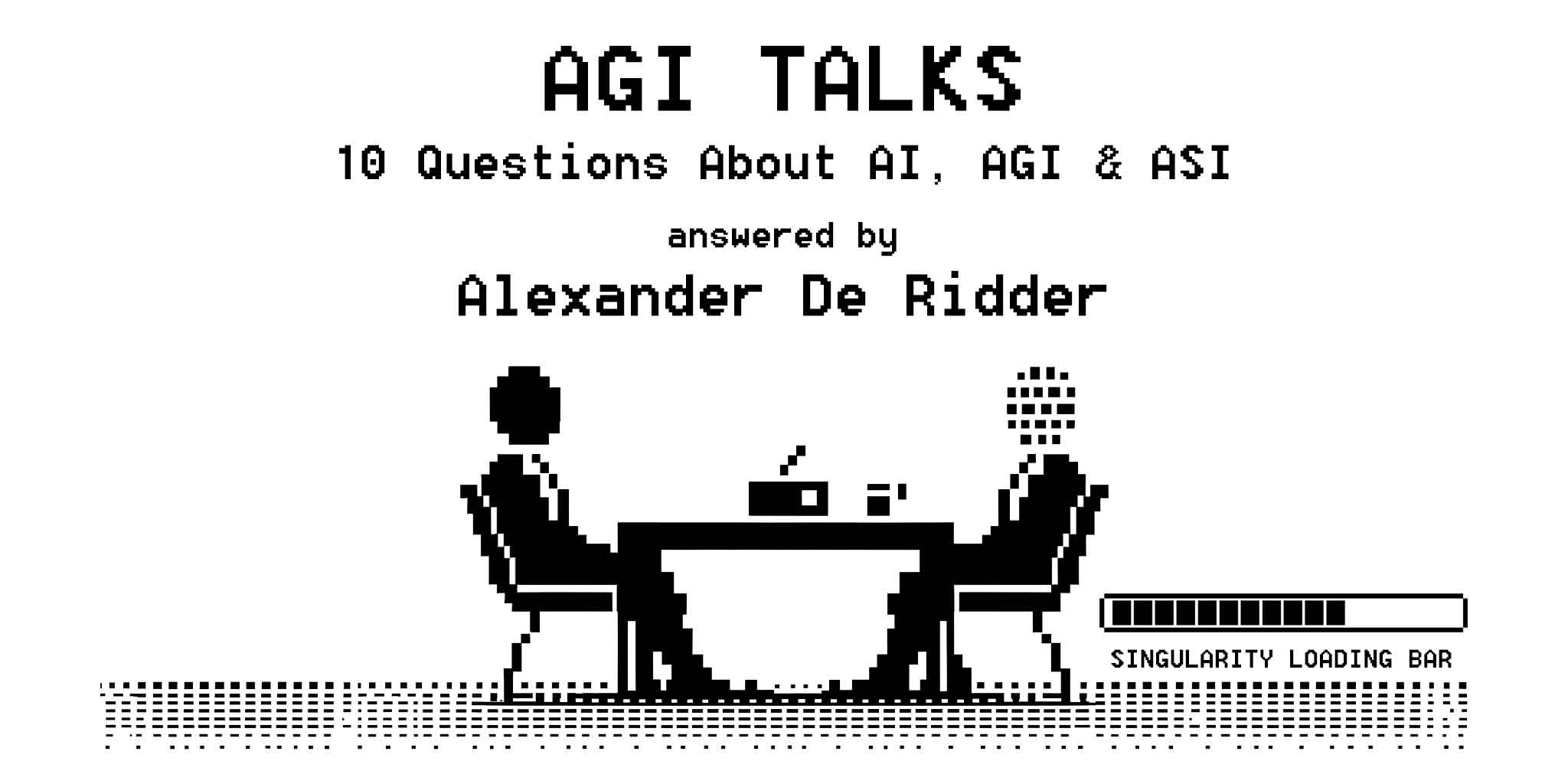Alexander De Ridder, AI visionary and CTO of SmythOS, discusses the transformative power of specialized AI systems and the future of human-AI collaboration.

In the newest interview of our AGI Talks series, Alexander De Ridder shares his insights on the potential impacts of Artificial General Intelligence (AGI) on business, entrepreneurship, and society.
About Alexander De Ridder

With a robust background that spans over 15 years in computer science, entrepreneurship, and marketing, Alexander De Ridder possesses a rare blend of skills that enable him to drive technological innovation with strategic business insight. His journey includes founding and successfully exiting several startups.
Currently he serves as the Co-Founder and Chief Technology Officer of SmythOS, a platform seeks to streamline processes and escalate efficiency across various industries. SmythOS is the first operating system specifically designed to manage and enhance the interplay between specialized AI agents.
Stationed in Houston, Alexander is a proactive advocate for leveraging AI to extend human capabilities and address societal challenges. Through SmythOS and his broader endeavors, he aims to equip governments and enterprises with the tools needed to realize their potential, advocating for AI-driven solutions that promote societal well-being and economic prosperity.
AGI Talks: Interview with Alexander De Ridder
In our interview, Alexandre provides insights on the impact of AI on the world of business and entrepreneurship:
1.What is your preferred definition of AGI?
Alexander De Ridder: The way you need to look at AGI is simple. Imagine tomorrow there were 30 billion people on the planet. But only 8 billion people needed an income. So, what would happen? You would have a lot more competition, prices would be a lot more affordable, and you have a lot more, you know, services, wealth, everything going around.
AGI in most contexts is a term used to define any form of artificial intelligence that can understand, learn, and utilize its intelligence to solve any problem almost like a human can. This is unlike narrow AI which is limited to the scope it exists for and cannot do something outside the limited tasks.
2. …and ASI (Artificial Superintelligence)?
ASI is an artificial intelligence that is on par with human intelligence in a variety of cognitive abilities, including creativity, comprehensive wisdom, and problem-solving.
ASI would be able to surpass the intelligence of even the best human minds in almost any area, from scientific creativity to general wisdom, to social or individual understanding.
3. In what ways do you believe AI will most significantly impact society in the next decade?
AI will enable businesses to achieve higher efficiency with fewer employees. This shift will be driven by the continuous advancement of technology, which will allow you to automate various tasks, streamline operations, and offer more personalized experiences to customers.
Businesses will build their own customized digital workers. These AI agents will integrate directly with a company’s tools and systems. They will automate tedious tasks, collaborate via chat, provide support, generate reports, and much more.
The potential to offload repetitive work and empower employees is immense. Recent research suggests that around 30% of activities currently performed by humans could be automated with AI agents. This will allow people to focus their energy on more meaningful and creative responsibilities.
Agents will perform work 24/7 without getting tired or getting overwhelmed. So, companies will get more done with smaller teams, reducing hiring demands. Individuals will take on only the most impactful high-value work suited to human ingenuity.
4. What do you think is the biggest benefit associated with AI?
AI enhances productivity by automating complex workflows and introducing digital coworkers or specialized AI agents, leading to potential 10x productivity gains.
For example, AI automation will be accessible to organizations of any size or industry. There will be flexible no-code interfaces that allow anyone to build agents tailored to their needs. Whether it’s finance, healthcare, education or beyond — AI will help enterprises globally unlock new levels of productivity.
The future of work blending collaborative digital and human team members is nearer than many realize. And multi-agent systems are the key to unlocking this potential and skyrocketing productivity.
5. …and the biggest risk of AI?
The integration of AI in the workplace highlights and enables mediocre workers in some cases. As AI takes over routine and repetitive tasks, human workers need to adapt and develop new skills to stay relevant
6. In your opinion, will AI have a net positive impact on society?
I will be very grateful to present a campaign to improve the general good of the world by making sure many people become aware of and exploit the opportunities within Multi-Agent Systems Engineering (MASE) capabilities. That will enable the implementation of AI agents for benevolent purposes.
In the future, non-programmers will easily assemble specialized AI agents with the help of basic elements of logic, somewhat similar to children assembling their LEGO blocks. I would advocate for platforms like SmythOS that abstract away AI complexities so domain experts can teach virtual assistants. With reusable components and public model access, people can construct exactly the intelligent help they need.
And collaborative agent teams would unlock exponentially more value, coordinating interdependent goals. A conservation agent could model sustainability plans, collaborating with a drone agent collecting wildlife data and a social media agent spreading public awareness.
With some basic training, anyone could become a MASE engineer — the architects of this AI-powered future. Rather than passive tech consumption, people would actively create solutions tailored to local needs.
By proliferating MASE design skills and sharing best agent components, I believe we can supercharge global problem solvers to realize grand visions. The collective potential to reshape society for the better rests in empowering more minds to build AI for good. This is the movement I would dedicate myself to sharing.
7. Where are the limits of human control over AI systems?
As AI proliferates, content supply will expand to incredible heights, and it will become impossible for people to be found by their audience unless you are a very big brand with incredible authority. In the post-AI agent world, everyone will have some sort of AI assistant or digital co-worker.
8. Do you think AI can ever truly understand human values or possess consciousness?
While AI continually progresses on rational tasks and data-based decision-making, for now it falls short on emotional intelligence, intuition, and the wisdom that comes from being human. We learned the invaluable lesson that the smartest systems aren’t the fully automated ones — they’re the thoughtfully integrated blend of artificial and human strengths applied at the right times.
In areas like branding, campaign messaging, and customer interactions, we learned to rely more on talent from fields like marketing psychology paired with AI support, not pure unsupervised generative text. This balancing act between automated solutions and human-centric work is key for delivering business results while preserving that “human touch” that builds bonds, trust, and rapport.
This experience highlighted that today’s AI still has significant limitations when it comes to emotional intelligence, cultural awareness, wisdom, and other intrinsically human qualities.
Logical reasoning and statistical patterns are one thing — but true connection involves nuanced insight into complex psychological dynamics. No amount of data or processing power can yet replicate life experiences and the layered understandings they impart.
For now, AI exists best as collaborative enhancements, not wholesale replacements in areas fundamental to the human experience. The most effective solutions augment people rather than supplant them — handling rote administrative tasks while empowering human creativity, judgment, and interpersonal skills.
Fields dealing directly in sensitive human matters like healthcare, education and governance need a delicate balance of automation coupled with experienced professionals. Especially when ethical considerations around bias are paramount.
Blending AI’s speed and scalability with human wisdom and oversight is how we manifest the best possible futures. Neither is sufficient alone. This balance underpins our vision for SmythOS — keeping a person in the loop for meaningful guidance while AI agents tackle tedious minutiae.
The limitations reveal where humans must lead, govern, and collaborate. AI is an incredible asset when thoughtfully directed, but alone lacks the maturity for full responsibility in society’s foundational pillars. We have much refinement ahead before artificial intelligence rivals emotional and contextual human intelligence. Discerning appropriate integration is key as technology steadily advances.
9. Do you think your job as an entrepreneur will ever be replaced by AI?
Regarding job displacement — we see AI as empowering staff, not replacing them. The goal is to effectively collaborate with artificial teammates to unlock new levels of innovation and fulfillment. We believe the future is “blended teams” with humans directing priorities while AI handles repetitive tasks.
Rather than redundancy, it’s an opportunity to elevate people towards more satisfying responsibilities better leveraging their abilities. Time freed from drudgery opens creative avenues previously unattainable when bogged down in administrative tasks. Just as past innovations like factories or computers inspired new human-centered progress, AI can propel society forward if harnessed judiciously.
With conscientious governance and empathy, automation can transform businesses without devaluing humanity. Blending inclusive policies and moral AI systems to elevate both artificial and human potential, we aim for SmythOS to responsibly unlock a brighter collaborative future.
10. We will reach AGI by the year…?
I think that one one-year window is too short to achieve AGI in general. I think that we (humans) will discover challenges and face delusions on some aspects, in order to re-evaluate our expectations from AI, and maybe AGI is not actually the holy grail, and instead, we should focus on AIs that will multiply our capabilities, instead of ones that could potentially replace us